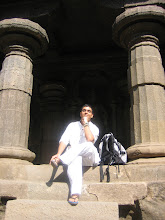 Ajahn Chah is considered one of the greatest Dhamma teachers of modern times. My own assessment of him? He's totally awesome! I think the first book of his I read was "Living Dhamma". His clear-sighted and direct, no nonsense presentation of the Dhamma was something I immediately took a liking to. Although coming from the Thai forest tradition, he has a very Ch'an-like style. My all time favorite book from him is "A Still Forest Pool", a collection of Dhamma talks compiled and edited by two of his students; Jack Kornfield and Paul Breiter. The explanation of the title is given by Ajahn Chah himself:
Ajahn Chah is considered one of the greatest Dhamma teachers of modern times. My own assessment of him? He's totally awesome! I think the first book of his I read was "Living Dhamma". His clear-sighted and direct, no nonsense presentation of the Dhamma was something I immediately took a liking to. Although coming from the Thai forest tradition, he has a very Ch'an-like style. My all time favorite book from him is "A Still Forest Pool", a collection of Dhamma talks compiled and edited by two of his students; Jack Kornfield and Paul Breiter. The explanation of the title is given by Ajahn Chah himself:Each person has his own natural pace. Some of you will die at age fifty, some at age sixty-five, and some at age ninety. So, too, your practices will not be identical. Don't think or worry about this. Try to be mindful, and let things take their natural course. Then your mind will become still in any surroundings, like a clear forest pool. All kinds of wonderful, rare animals will come to drink at the pool, and you will clearly see the nature of all things. You will see many strange and wonderful things come and go, but you will be still. This is the happiness of the Buddha.
I came across this book when I was living rather close to the Temple of Enlightenment in The Bronx. The temple is part of the Buddhist Association of the United States, an organization that prints and distributes many of the free Dharma books in circulation. "A Still Forest Pool" deals mostly with the practice of meditation, particularly vipassana, but Ajahn Chah discusses many other topics as well. After finishing the second part of the book, I turned the page to Part III, entitled "Our Life is Our Practice". As soon as I read this, I paused. My reaction went something like this: Our life is our practice? Hmmm. Our life is our practice. Whoa, wait. Our life is our practice! That's it! Our LIFE is our PRACTICE! So simple and yet so profound! I just had a classic Ajahn Chah moment. All of this before even reading any of the actual talks on the topic! The preface to the "Our Life is Our Practice" chapter is below:
Meditation is not separate from the rest of life. All situations provide opportunity to practice, to grow in wisdom and compassion. Achaan Chah teaches that the right effort for us is to be mindful in all circumstances without running away from the world but to learn to act without grasping or attachment.
Furthermore, he insists that the foundation of a spiritual life is virtue. Although virtue is neglected in our modern society, it must be understood and honoured as a fundamental part of meditation. Virtue means taking care so that we do not harm other beings by thought, word, or deed. This respect and caring puts us into a harmonious relationship with all life around us. Only when our words and deeds come from kindness can we quiet the mind and open the heart. The practice of non-harming is the way to begin turning all life situations into practice.
To further establish our lives on the Middle Way, Achaan Chah recommends moderation and self reliance. A life of excess is difficult soil for the growth of wisdom. To take care with the basics-such as moderation in eating, sleeping, and in speech-helps bring the inner life into balance. It also develops the power of self-reliance. Don't imitate the way others practice or compare yourself to them, Achaan Chah cautions; just let them be. It is hard enough to watch your own mind, so why add the burden of judging others. Learn to use your own breath and everyday life as the place of meditation and you will surely grow in wisdom.
The "eureka" moment however, was simply the beginning. Before I knew it, I was grilling myself with a series of heavy questions which ultimately coalesced into just one: why do I practice?
Why do I practice? What point, if any, is there to it all? I wouldn't call my questions a "crisis of faith" or a "dark night of the soul" but I really had to sit down and think about this. Why do I practice? Why do you practice? Why did the Buddha practice? Why did anyone over the past 2500 years practice? Why are people practicing now?
I certainly can't speak for everyone else but I can speak for myself. I don't practice because I find the teachings of the Buddha and meditation interesting even though I'm absolutely fascinated by it all. I don't practice because it makes me feel good, although it certainly does help me cultivate a positive outlook. I don't practice because I'm fascinated by an ancient, exotic religion even though I find the art and aesthetics of many Buddhist traditions very pleasant. I don't practice because I'm looking for inner peace although I do find myself calmer and more relaxed.
After much contemplation, it occurred to me that the reason I practice can be summed up in one word: dukkha i.e. suffering or unsatisfactoriness. The Four Noble Truths are often described as the "elephant's footprint" of the Buddha's teachings. Just as the footprint of an elephant encompasses the footprints of all other animals, so too do the teachings of the Four Noble Truths encompass all the myriad practices on the Path to Awakening.
It is not so much the existence of dukkha that spurs me on. As being stuck in samsara, the cycle of death and rebirth, dukkha is a given. Rather, its the fact that we don't have to experience suffering and that we have the ability to stop it. My fundamental motivation for actually practicing is the Bodhisattva Vow: to wake up along with everyone else. The Four Great Vows, which are themselves a reinterpretation of the Four Noble Truths, is the classic expression of a bodhisattva's practice:
Sentient beings are numberless; I vow to save them.
Desires are inexhaustible; I vow to put an end to them.
Dharmas are boundless; I vow to master them.
The Buddha Way is unattainable; I vow to attain it. (MRO translation)
Looks likes like we've got much work ahead of us...








No comments:
Post a Comment